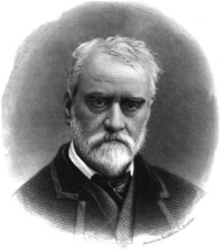William Batchelder Greene
William Batchelder Greene (April 4, 1819 – May 30, 1878) was a 19th-century individualist anarchist, Unitarian minister, soldier and promoter of free banking in the United States.
William Batchelder Greene | |
|---|---|
 | |
| Born | April 4, 1819 |
| Died | March 11, 1878 (aged 58) Somerset, England |
| Nationality | American |
| Alma mater | Harvard (1841) |
| Thesis | De cosinuum et sinuum potestatibus secundum cosinus et sinus arcuum multiplicium evolvendis / von Ernst Eduard Kummer (1832) |
| Doctoral students | Paul Du Bois-Reymond |
Biography
Born in Haverhill, Massachusetts, Greene was the son of the Democratic journalist and Boston postmaster Nathaniel Greene. He was appointed to the United States Military Academy from Massachusetts in 1835, but he left before graduation. He was made 2nd lieutenant in the 7th infantry in July 1839 and after serving in the second Seminole War resigned in November 1841. Subsequently, he was connected with George Ripley's utopian movement at Brook Farm, after which he met several transcendentalists including Orestes Brownson, Elizabeth Peabody and Ralph Waldo Emerson.[1] He studied theology at Harvard Divinity School, graduating in 1845. He was a pastor at a Unitarian church in Brookfield, Massachusetts before leaving to Europe.
Greene returned in 1861 to serve in the American Civil War. Although a Democrat, he was a strong abolitionist and at the beginning of the Civil War became colonel of the 14th Massachusetts Infantry, afterward the 1st Massachusetts Heavy Artillery. In 1862, while stationed with his regiment in Fairfax, Virginia he was recalled and assigned by General George McClellan to the command of an artillery brigade in Geneneral Amiel Weeks Whipple's division. He resigned his commission in October 1862 to continue his travels and writings.
According to James J. Martin in Men Against the State, Greene did not become a "full-fledged anarchist" until the last decade of his life, but his writings show that by 1850 he had articulated a Christian mutualism, drawing heavily on the writings of Pierre-Joseph Proudhon's sometimes-antagonist Pierre Leroux (see Equality; 1849 and Mutual Banking; 1850), writing in The Radical Deficiency of Existing Circulating Medium (1857):
The existing organization of credit is the daughter of hard money, begotten upon it incestuously by that insufficiency of circulating medium which results from laws making specie the sole legal tender. The immediate consequences of confused credit are want of confidence, loss of time, commercial frauds, fruitless and repeated applications for payment, complicated with irregular and ruinous expanses. The ultimate consequences are compositions, bad debts, expensive accommodation-loans, law-suits, insolvency, bankruptcy, separation of classes, hostility, hunger, extravagance, distress, riots, civil war, and, finally, revolution. The natural consequences of mutual banking are, first of all, the creation of order, and the definitive establishment of due organization in the social body, and, ultimately, the cure of all the evils. which flow from the present incoherence and disruption in the relations of production and commerce.
In his radical, anonymously published pamphlet Equality, Greene had this to say about equality before the law: "It is right that persons should be equal before the law: but when we have established equality before the law, our work is but half done. We ought to have EQUAL LAWS also". His comments were directed towards the creation of corporations.[2]
Greene was a fine mathematician and was versed in Hebrew literature and in Hebrew and Egyptian antiquities.
Mutual Banking
Greene is best known for the works Mutual Banking[3] which proposed an interest-free banking system; and Transcendentalism, a critique of the New England philosophical school. In 1850 and 1851, he organized citizens of Brookfield, Warren and Ware, Massachusetts to petition the state's General Court for a charter to establish a mutual bank. Upon all the petitions and after hearing the arguments of the petitioners, the Committee on Banks and Banking reported simply: "Leave to withdraw!" (The Radical Deficiency of the Existing Circulating Medium, 1857). Similar attempts by the New England Labor Reform League in the 1870s met with similar results. Greene's mutualist banking ideas resembled those of Pierre-Joseph Proudhon as well as the land banks of the colonial period. He had an important influence on Benjamin Tucker, the editor of the anarchist journal Liberty.
Death
Greene spent his final days in Somerset, England. His remains were transported to Boston to be buried at Forest Hills, Roxbury (Jamaica Plain).[4]
Noted works
- Mutual Banking. Boston: New England Labor Reform League, 1870.
- Remarks on the Science of History, followed by an a priori Autobiography (1849).
- Equality. West Brookfield, Mass.: O.S. Cooke, 1849.
- Mutual Banking. West Brookfield, Mass.: O.S. Cooke, 1850.
- Sovereignty of the People, pamphlet (Boston, 1863).
- Heywood, Ezra and William B. Greene. Declaration of Sentiments and Constitution of the New England Labor Reform League. Boston, Weekly American Workman, 1869.
- Explanations of the Theory of the Calculus, pamphlet (1870).
- Transcendentalism, pamphlet (1870).
- Theory of the Calculus (1870).
- The Facts of Consciousness and the Philosophy of Mr. Herbert Spencer, pamphlet (1871).
- The Blazing Star: With an Appendix Treating of the Jewish Kabbala. Also, a Tract on the Philosophy of Mr. Herbert Spencer and One on New-England Transcendentalism. Boston: A. William and Co., 1872.
- The Working Woman: A letter to the Rev. Henry W. Foote, Minister of King's Chapel, in vindication of the poorer class of the Boston working-women. Princeton, Mass.: Co-operative Pub. Co. (1873).
- Socialistic, Communistic, Mutualistic, and Financial Fragments (1875).
- International Address: An elaborate, comprehensive, and very entertaining Exposition of the principles of the Working-People's International Association.
Further reading
(in French) Ronald Creagh (1983). L'Anarchisme aux États-Unis 1826 - 1896. Coll. Études Anglo-américaines. Pris: Klincksieck. ISBN 2864600234. See Chapter 8. William B. Greene et les origins du mouvement anarchiste dans le Massachusetts. pp. 343–398.
References
- Wayne, Tiffany K. (May 14, 2014). Encyclopedia of Transcendentalism. Infobase Publishing. ISBN 978-1-4381-0916-9.
- Sarat, Austin (September 2016). 10.3M - Rhetorical Processes and Legal Judgments: How Language and Arguments Shape. ISBN 9781107155503. Retrieved May 14, 2014.
- "Mutual Banking". The Portal. Retrieved November 28, 2014.
- Wilbur, Shawn (November 14, 2007). "Masonic Tribute to William B. Greene". Libertarian Labyrinth. Retrieved July 28, 2019.
External links
- William Batchelder Greene. Libertarian Labyrinth.
- Ruch, John (August 2007). "Anarchy in JP: Greene was early local radical". Jamaica Plain Gazette.
- "In Memoriam". (1878). A tribute by the Massachusetts Masons.
- . Appletons' Cyclopædia of American Biography. 1900.
- The Radical Pamphlet Collection at the Library of Congress has material written by Greene.


